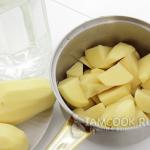0 percent cottage cheese is saturated with vitamins A, C, PP, group B, as well as minerals potassium, magnesium, calcium, phosphorus, sodium, and iron.
The low calorie content of low-fat cottage cheese per 100 grams allows this product to be used in any diet.
Nutritionists say that such dairy products are indispensable for those losing weight, since such cottage cheese contains enough a large number of protein (more than 15 g). Let us remind you that in accordance with the current WHO regulations, men are recommended to consume 0.75 g of protein per 1 kg of weight per day; for women this figure is 0.5 g of protein per 1 kg of weight.
Calorie content of 1% cottage cheese per 100 grams
Calorie content of 1% cottage cheese per 100 grams is 79 kcal. 100 g of product contains 16.2 g of protein, 1 g of fat, 1.3 g of carbohydrates. Cottage cheese is rich in fluoride, copper, calcium, magnesium, and is recommended for strengthening bones and normalizing heart function.
In cooking, 1 percent cottage cheese is used to make casseroles, cakes, pancakes, dumplings, and cheesecakes.
The calorie content of cottage cheese is 2 percent per 100 grams
The calorie content of cottage cheese with 2 percent fat content per 100 grams is 102 kcal. 100 grams of product contain 17.9 g of protein, 2 g of fat, 3.4 g of carbohydrates. 2% cottage cheese is rich in amino acids. Due to the rich amino acid composition of proteins dairy product are absorbed much better than meat or fish proteins.
The calorie content of cottage cheese is 5 percent per 100 grams
The calorie content of cottage cheese with a fat content of 5 percent per 100 grams is 120 kcal. 100 g of product contains 17.1 g of protein, 5 g of fat, 1.9 g of carbohydrates. Due to its good vitamin and mineral composition, 5 percent cottage cheese is recommended for improving the functioning of the gastrointestinal tract, enhancing immunity, and saturating the body with energy.
Cottage cheese calorie content is 9 percent per 100 grams
The calorie content of cottage cheese is 9 percent per 100 grams, 160 kcal. 100 g of product contains 16.8 g of protein, 9 g of fat, 2.1 g of carbohydrates. 9% cottage cheese is indispensable after viral infections, to increase immunity in the postoperative period.
Contraindications to the use of the product are disorders of the liver, in which it is necessary to minimize the intake of calcium and protein into the body.
Calorie content of homemade cottage cheese per 100 grams
The calorie content of homemade cottage cheese per 100 grams when preparing the product from 1 percent milk is 167 kcal. In 100 g of such cottage cheese there are 17.7 g of protein, 6.5 g of fat, 11.4 g of carbohydrates.
Homemade cottage cheese recipe:
- 3 liters of sour 1 percent milk are mixed with 0.6 liters of kefir, heated over low heat to a temperature of 35 ° C;
- while the milk is heating up, cover a colander with a cloth folded in 6 layers (the edges of the fabric should hang freely from the colander);
- a colander is attached to the container for draining the whey;
- the heated milk is thrown into a colander and a little flows out;
- Without squeezing the resulting mass, tighten the corners of the fabric with a knot;
- the knitted fabric is suspended above the whey container;
- After a few hours, the excess liquid will drain and the cottage cheese will be ready.
Calorie content of cottage cheese with sour cream and sugar per 100 grams
The calorie content of cottage cheese with sour cream and sugar per 100 grams is 169 kcal. 100 g of product contains 13 g of protein, 8.6 g of fat, 9.3 g of carbohydrates. To prepare a sweet dish, you need to grind 0.2 kg of cottage cheese with 25 g of sugar, mix the resulting mass with 40 g of sour cream.
Calorie content of cottage cheese with raisins per 100 grams
The calorie content of cottage cheese with raisins per 100 grams depends on the quantity and type of products included in the sweet dish. When mixing 10 g of raisins and 90 g of cottage cheese, the number of calories will be:
- for cottage cheese 0 percent - 90.3 kcal;
- for cottage cheese 1 percent - 97.5 kcal;
- for cottage cheese 2 percent - 118.2 kcal;
- for cottage cheese 5 percent - 134.4 kcal;
- for cottage cheese 9 percent - 170.4 kcal;
- for homemade cottage cheese – 176.7 kcal.
Calorie content of grain cottage cheese per 100 grams
The calorie content of grain cottage cheese per 100 grams at 5% fat content of the product is 105 kcal. 100 g of such cottage cheese contains 12.7 g of protein, 5 g of fat, 2.4 g of carbohydrates. The grain product contains a hardener, starter culture, skim milk, enzyme preparation, salt, cream, potassium sorbate.
Benefits of cottage cheese
Known next benefit cottage cheese:
- thanks to high content easily digestible protein, cottage cheese is useful for people of all ages;
- low-fat cottage cheese is rich in vitamins and minerals and has minimal calorie content, which makes it an essential component of dietary nutrition;
- low-fat cottage cheese is indispensable for children aged 3 years and older; it is necessary to maintain protein balance in the body during breastfeeding and pregnancy;
- cottage cheese minerals strengthen teeth, bones, hair, ensure healthy blood vessels and heart muscle;
- cottage cheese is rich in tryptophan and methionine, which prevent fatty liver and normalize the functions of the gallbladder;
- The minerals in cottage cheese are important for the health of the nervous system.
Harm from cottage cheese
The harm of cottage cheese occurs when consuming a low-quality product or overeating. When purchasing, be sure to ensure that all requirements are met. heat treatment and storage of cottage cheese.
Contraindications to consuming cottage cheese are:
- worsened kidney disease;
- high cholesterol;
- tendency to obesity and atherosclerosis;
- product intolerance;
- exacerbation of stomach and intestinal diseases.
Low-fat dairy products are becoming more and more popular, and all thanks to propaganda healthy eating. Low-fat cottage cheese, the calorie content of which will be discussed in this article, is especially appreciated by people who want to get rid of it and are actively involved in sports. Such low-fat products cause a lot of conflicting opinions, as some consider them absolutely useless. Let's try to understand this topic and still find the truth.
How many calories are in 0% cottage cheese?
The chemical composition of cottage cheese of different fat contents is almost identical; it contains protein, vitamins, minerals, and others. useful material. It is also worth saying that when the fat content in cottage cheese decreases, fat-soluble vitamins A, D and E are destroyed.
Now about the main thing, the calorie content of 0-fat cottage cheese can vary from 90 to 115 kcal per 100 g. This product is used in low-carbohydrate and protein diets. Based on it, various spreads on bread and healthy desserts. They put it in various additives, for example, honey, fruits, sour cream, herbs, etc. Just keep in mind that the energy value of the product also increases. Thus, the calorie content of low-fat cottage cheese with honey increases due to the presence of simple carbohydrates. At the same time, the body becomes full faster, which helps cope with hunger during the day. long time, and also with such a dessert a person satisfies his desire to enjoy something sweet and very high in calories. Another popular dessert among those losing weight is low-fat cottage cheese with sour cream, the calorie content of which will depend on the fat content of the sour cream, but on average there are about 140 kcal per 100 g. If you add fruit to such a fermented milk product, the energy value will increase by about 30 kcal.
Benefit or harm?Many people know about the benefits of fermented milk products, so we suggest focusing on possible harm, which can be obtained from low-fat cottage cheese. There is no active harm other than an allergic reaction due to individual intolerance to the product, but there are still several properties due to which many doubt the benefits of such cottage cheese:
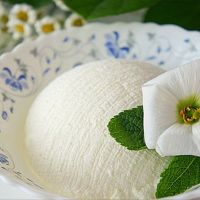
Of course, you can experience similar harm if you eat only one low-fat cottage cheese. If you are not going to do this, then you should not worry about being harmed by a portion of such a product. Products in your diet must be selected depending on your needs, that is, if you want to lose weight, then low-fat cottage cheese is for you, and if you replenish calcium reserves, then it is better to choose a fattier option.
Another topic worth touching on is how many calories are contained in homemade low-fat cottage cheese, since many housewives prefer to prepare fermented milk products themselves. In this case, the energy value does not increase much and is 108 kcal per 100 g.
The calorie content of cottage cheese directly depends on its variety, production method and raw materials used. Currently, it is customary to divide cottage cheese into three categories: low-fat (1.8%), classic (4-18%) and the most delicious and satisfying – full-fat cottage cheese (19-23%). The more fat in the composition, the higher the calorie content of the product.
Calorie content of dietary low-fat cottage cheese
This is the lightest type of cottage cheese, the fat content of which can be from 0.6 to 1.8%. Considering that each gram of fat contains 9 kcal, the difference with fatty varieties it turns out impressive.
For every 100 g of low-fat cottage cheese there are 86 kcal, and in composition it is almost pure protein. It is enriched with a standard set of vitamins and minerals for cottage cheese, including A, B, E, C, D, H, potassium, phosphorus, sodium, fluorine and many others. However, nutritionists have mixed opinions regarding this product.
On the one hand, pure protein is an excellent means of maintaining muscle mass. On the other hand, without at least minimum quantity milk fat (5%) neither calcium nor vitamins A, E and D are simply absorbed by the body! That is why you cannot completely switch to such a product; it can only complement other types of cottage cheese to reduce the calorie content of the product.
How many calories are in low-fat cottage cheese?
Low-fat cottage cheese contains 5% fat, which gives it an advantage over all other types: it is quite light, but at the same time balanced well enough, which allows the body to absorb nutrients to the maximum.
This cottage cheese has a low calorie content per 100 grams - 145 kcal. This product is great for making diet cheesecakes, light breakfast, afternoon snack, or post-sports workout snack. When dieting for weight loss, it is best to use this type of cottage cheese in your daily diet.
Calorie content of cottage cheese 9%
There are 159 kcal per hundred grams of this product. It has a soft delicate taste, and is one of the most popular varieties. In order to use it in dietary nutrition, it is best to mix it with low-fat cottage cheese in a proportion that suits your taste best. This way you will ensure both the digestibility of nutrients and a relatively low calorie content. IN pure form It is better not to consume such cottage cheese after a workout, especially if it is designed for weight loss and.
Calorie content fat cottage cheese fat 18%
This kind of cottage cheese is most similar to rustic cottage cheese, incredibly soft and pleasant. Its calorie content is 232 kcal per 100 g, which makes it quite heavy. Products with such a high fat content can be included in the diet when losing weight only for breakfast, in a mixture with low-fat, and then only occasionally (once a week) - to prevent problems with skin, hair and nails. Milk fat has a very beneficial effect on 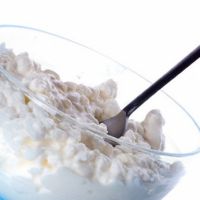 appearance, which explains the abundance of recipes for hair and face masks with milk and dairy products.
appearance, which explains the abundance of recipes for hair and face masks with milk and dairy products.
Calorie content of cottage cheese with maximum fat content 23%
It's pretty rare variety cottage cheese, from which you can prepare an incredibly tasty, but high-calorie dessert. Its energy value is 311 kcal per 100 g. If you are obese and overweight, you can afford this product in limited quantities no more than several times a year, or better yet, accustom yourself to the taste of low-fat foods.
Do not forget that fatty dressings, dried fruits and nuts that you add to it can add calories to cottage cheese. Therefore for dietary option it is better to choose a white yogurt dressing and fresh berries or fruit.
Jan-11-2013
Cottage cheese is wonderful food product, healing and with excellent taste qualities. It is obtained by fermenting milk and then removing the whey. It consists mainly of water and milk protein. It is the composition that determines the type of cottage cheese. Among them, low-fat cottage cheese should be noted, the calorie content of which is relatively low, and its benefits are no less than those of fatty cottage cheese.
It is not surprising that low-fat cottage cheese especially attracts the attention of people watching their weight. The calorie content of this product is inferior to that of homemade (fat) cottage cheese, but this is exactly what you need.
Dietary properties of low-fat cottage cheese:
This product contains antibacterial components that inhibit the development of putrefactive bacteria and normalize the microflora of the intestinal tract. Lactose is converted into lactic acid under the action of lactic acid bacteria, which in turn contributes to more efficient absorption of phosphorus and calcium from cottage cheese.
Phosphorus and calcium are minerals that fermented milk products are especially rich in. They give our bones and teeth strength. And these substances are of particular importance in baby food. Milk protein concentrate is the main “raw material base” in the cell building process. Yogurt, kefir and cottage cheese begin to be present in baby food before milk, since they do not provoke allergic reactions and are easily digestible.
Low-fat cottage cheese is wonderful protein product, in which about 17% protein and relatively a small amount of fat (0.5%). This cottage cheese has a low calorie content - about 80 kcal per 100 g of product, which makes it recommended for obese people. For gout and other diseases associated with metabolic disorders, when meat or fish proteins cannot be consumed, they are replaced with cottage cheese proteins.
Cottage cheese is a product that is widely used in dietary nutrition. The basis of a fairly effective dairy diet is precisely fermented milk products. And even if you restrict yourself in nutrition, you can successfully prepare a variety of products from cottage cheese. delicious dishes. These recipes are known to every housewife.
In fact, this cottage cheese differs from high-fat cottage cheese in its nutritional and energy value. IN low-calorie cottage cheese fat content is kept to a minimum. This gives it the properties of a dietary product. This means that all or almost all milk fat has been removed from the raw material - milk - by separation. This gives people who are losing weight the opportunity to use this product and not worry about being overweight.
Is low-fat cottage cheese healthy? But has all of it been preserved? healing benefits cottage cheese? Skim cheese together with the high-calorie component, it is partially or completely deprived of the following substances and properties:
Fat-soluble vitamins A, D, E are practically absent in low-fat cottage cheese. As a result, the bioavailability of calcium decreases. From low-calorie product it is absorbed worse.
Lecithin and cephalin also disappear along with milk fat. The content of proteins and amino acids is slightly reduced. Judge for yourself what low-fat cottage cheese can give to the body?
The benefits of reduced-calorie cottage cheese are controversial among nutritionists. Some say that this product loses most of its amazingly beneficial properties along with fat. Others argue that a light product becomes available to people with obesity and atherosclerosis. Oddly enough, both are right in their own way.
Nutrition experts advise approaching this issue wisely. If you do not have a serious illness (atherosclerosis or kidney failure), then you should not worry about the dilemma: what fat content of cottage cheese is better and healthier to eat? Fight with overweight must be literate. It's better to eat classic cottage cheese, enjoy its wonderful creamy taste and enrich your body with unique natural beneficial substances, and the accumulated calories can very easily be spent by training in the gym or jogging in the park in the fresh air
In addition, they are very much appreciated beneficial features low-fat cottage cheese in cooking, because it is part of numerous low-calorie dishes, which constitute the basis, for example, for a dietary diet. Low-fat cheesecakes, cheesecakes and dumplings, aromatic casseroles using low-fat cottage cheese are practically no different from dishes prepared using fattier types of this fermented milk product.
By including low-fat cottage cheese in your menu, you will not gain weight, and if you add, for example, a small amount of any fruit, you will get a tasty and healthy dish. So, cottage cheese with banana has an excellent taste, children really like it and is useful for those who want to lose weight. But if you add a spoonful of honey to low-fat cottage cheese, the result will not only be dietary dish, but also enrich the body with many beneficial nutrients.
Well, what exactly is the calorie content of this product? And here's what:
The calorie content of low-fat cottage cheese is only 71 kcal per 100 grams of product
This quality of cottage cheese makes it even more popular among lovers of delicious food. It contains the same set of useful components as fatty acids. homemade cottage cheese. But at the same time, it will not harm those who are on a diet.
What is the calorie content of this product when prepared? different ways? And here it is:
Calorie table for low-fat cottage cheese, per 100 grams of product:
A the nutritional value this product, prepared in different ways, is like this:
Table of nutritional value of low-fat cottage cheese, per 100 grams of product:
Is it possible to prepare something at home from this product? Of course you can! Here is one of the recipes:
Cheese balls
Products:
- — Cottage cheese (low-fat) — 500 gr.
- — Grated cheese — 300 gr.
- — Chicken eggs — 2 pieces
- — Flour — 6 tablespoons
- — Baking powder for dough — 1 package
The cottage cheese needs to be kneaded. Combine it with cheese, eggs, 2 tablespoons of flour and baking powder. All components should be mixed thoroughly.
Pour all the remaining flour into a separate plate. Separate a little dough, dip it in flour and roll into a ball. Pour into the frying pan sunflower oil. Heat and place the rolled cheese balls there.
The balls are fried on both sides until they acquire a golden color. That's all! You can try! Moreover, relatively low calorie content low-fat cottage cheese will not spoil your figure in any way
How to make low-fat cottage cheese at home
At home, all the specifics and technology for preparing cottage cheese from milk are the same and simple. The milk is pasteurized, cooled and seasoned with starter (kefir, sour cream, yoghurt, fermented baked milk). Standard proportions: 3-4 tablespoons of starter are used for 1 liter of milk.
The prepared mixture is mixed and placed in a warm place for 8-10 hours. Afterwards, the curd curd is separated from the whey. Ready cottage cheese You can flavor it with sour cream, if you want a product with more calories, cream or fruit.
Cottage cheese made from skim milk, is a dietary and at the same time complete energy product containing all useful substances. Low-fat cottage cheese is ideal for consumption by people on a fat-restricted diet; 100 g of this product contains less than 1.8% fat.
Pasteurized low-fat or one percent milk is used for this process. The entire preparation procedure is similar to obtaining cottage cheese from regular milk, the only difference is that the ripening of such a product naturally will take much longer, so to speed up the process, starters in the form of low-fat yogurt or kefir are used. To sour one liter of milk you will need 2-3 tbsp. l. sourdough
Low-fat cottage cheese is made from low-fat milk. From 50 grams of milk you get approximately 20 grams of cottage cheese. How many calories are in this product is a popular question, since it is considered very healthy and dietary. Low-fat cottage cheese contains from 70 to 110 kcal per 100 grams of product.
Energy value
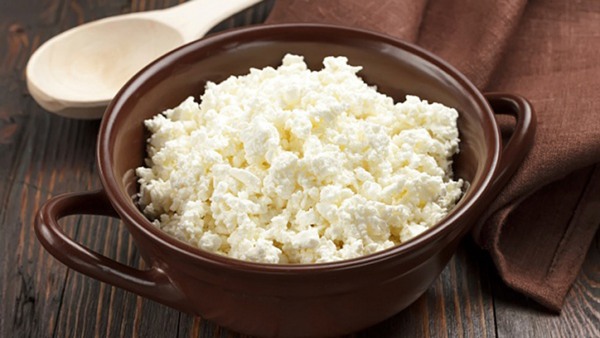
One hundred grams of low-fat cottage cheese contains:
Benefit for health
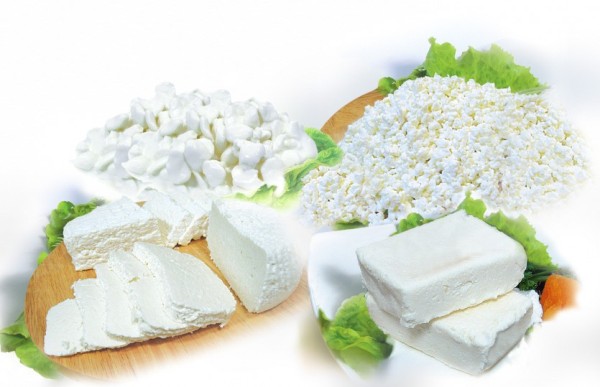
Cottage cheese contains a lot of calcium, which is especially necessary for children and adolescents for the proper formation of the skeleton and teeth. It is well known that children whose diet includes curd products during the formation of molars, they are less likely to need the services of dental clinics. Not every child likes this product in his/her in kind, but there are many recipes that turn it into a delicacy. Adding honey, nuts, marmalade and dried fruits makes the dish even healthier, although it increases its calorie content. How many calories you get in a serving can be calculated by summing up the calorie content of all the products used.
Cottage cheese also contains amino acids and vitamins necessary for health. This product is a means of preventing liver diseases and atherosclerosis. Its use by women during pregnancy allows them to obtain enough calcium for the child and avoid deterioration of the condition of the skin and hair.
If the goal of weight loss is not pursued, it is better to consume moderate-fat cottage cheese. The vitamin D contained in this product is fat-soluble, so it is absorbed only together with fats. There is a point of view that low-fat foods are unbalanced and practically useless for health. Some nutritionists believe that best choice there will be a product with a fat content of 1%, which will not add excess weight, but will help the body absorb the maximum amount of vitamins.
Regular consumption of cottage cheese normalizes the amount of hemoglobin in the blood. The content of B vitamins makes it useful product for the nervous system.
Low-fat cottage cheese does not cause harm to health, no matter how much it is eaten. The only mandatory conditions are freshness and the absence of harmful additives.
Useful material
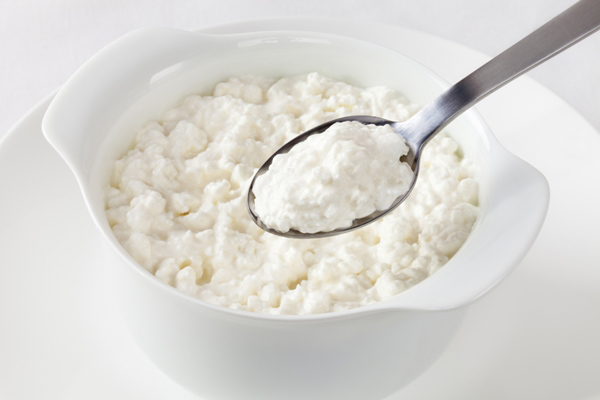
How many vitamins and minerals are included in a dairy product depends on the milk from which it is made.
Vitamins:
- B1, B2, B5, B6, B9, B12;
Minerals:
- calcium – 120 mg;
- zinc – 0.364 mg;
- magnesium – 24 mg;
- phosphorus – 189 mg;
- iron – 0.3 mg;
- manganese – 0.008 mg;
- sodium – 44 mg;
- fluoride – 32 mcg;
- potassium – 117 mg;
- selenium – 30 mcg;
- sulfur – 220 mg;
- copper – 60 mg;
- chlorine – 115 mg;
- molybdenum – 7.7 mcg.
Calorie content
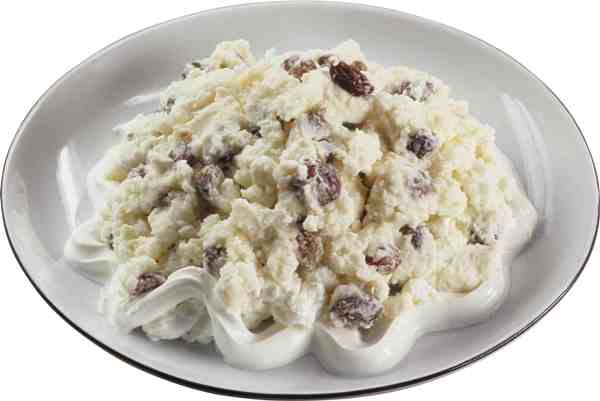
The table provides information on how many calories are contained in 100 grams of popular curd products.
Recipes and their calorie content
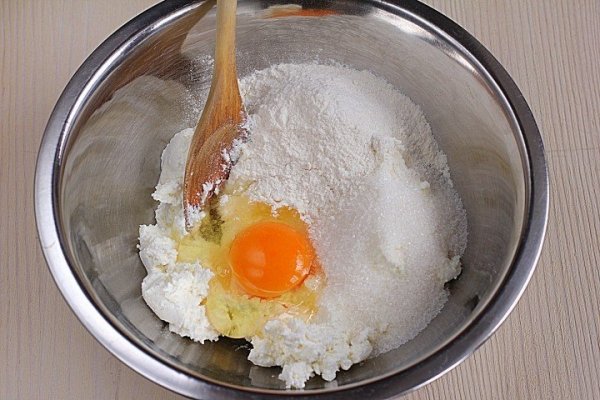
You can make a variety of low-fat cottage cheese unusual desserts and delicious dishes that both adults and children enjoy. Instead of sugar, you can add honey or stevia to curd products.
| Name | Recipe | Calorie content, kcal / 100 grams |
| Banana Casserole | Compound:
Consistently combine cottage cheese, eggs, semolina, honey and chopped banana. Grease the mold with oil. Bake for 30 minutes at 180 degrees. If other fruits are used, their calorie content should be added together. |
122,3 |
| Curd chocolate jelly | Compound:
Soak gelatin in a glass cold water for half an hour. Add milk, stevia, cocoa and cinnamon. Heat until dissolved, do not boil, then leave to cool. Beat the cottage cheese with a blender and combine with the cooled mixture. Pour the mixture into molds and refrigerate for 6 hours. |
110 |
| Syrniki | Compound:
All ingredients are mixed and baked into flatbreads in the oven. Baking time is 15 minutes and temperature is 180 degrees. |
136 |
| Curd balls | Compound:
Cottage cheese, eggs, 3 tbsp. Stir spoons of sugar and flour thoroughly. Make balls and cook them in boiling water until they float. Grease the mold with oil and place the boiled balls on it. Pour sauce made from sour cream, sugar and poppy seeds. Bake in the oven for 25 minutes at 180 degrees |
198 |
Low-fat cottage cheese is a fairly tasty and harmless product from which you can prepare many low-calorie dishes. To obtain maximum benefit when eating it, it is better to pay attention to options with a fat content of more than 0%, since fats are necessary for the body to absorb certain substances. Cottage cheese with 0% fat content is dietary product, which is suitable for a healthy diet during weight loss.


